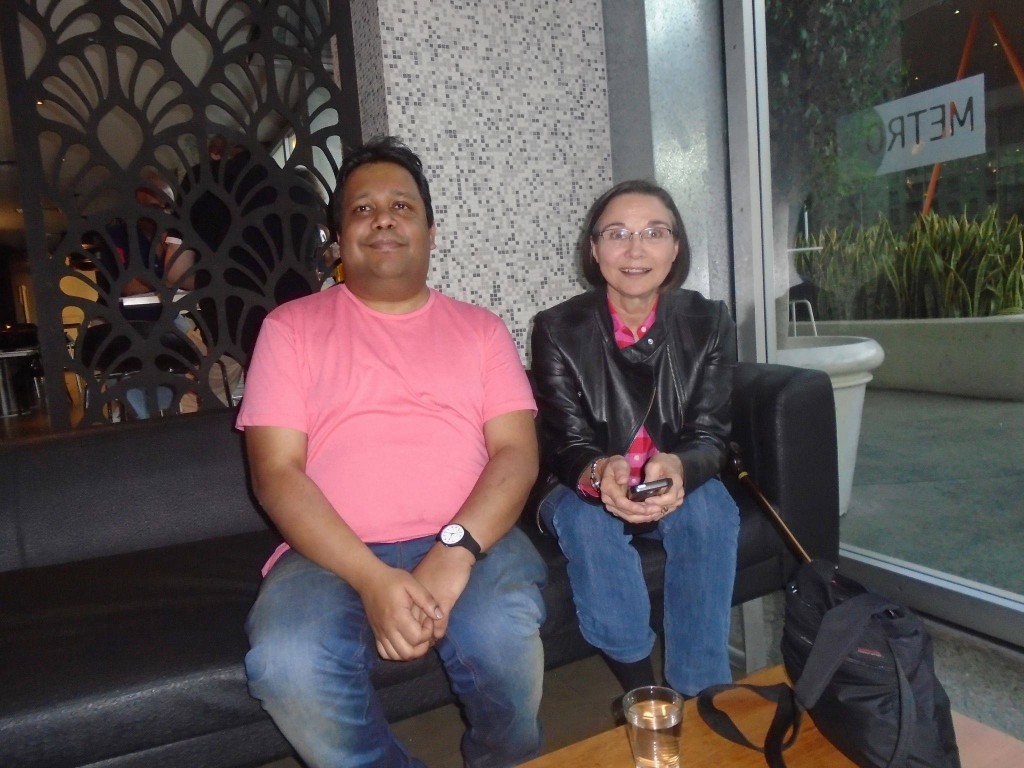Err… since this photo was taken in the Hotel Adina, opposite the conference centre hosting the Alzheimer’s Disease International (ADI) conference for 2014, I have lost a lot of weight (I wish.)
But actually literally seconds before this snap was taken, Kate had said ‘you goose!’ in utter surprise when I suggested to Kate she should turn her roaming charges off. We were, of course, both in Australia, and the country of habitual residence of Kate is also Australia.
I have many happy memories of that conference, though overall I tend to be antagonistic of conferences. Most of the plenary speakers tend to be overwhelmingly underwhelming.
There are of course some exceptional speakers. I always enjoy the updates on Prof Martin Prince on epidemiology of dementia, with a focus on low and middle income countries. I know this is a complicated area, as I am sure Prof Carol Brayne from my alma mater will demonstrate in Budapest for this year’s ADI conference.
Many of the pervasive issues internationally about living with dementia also relate very much to domestic jurisdictions: including research, drug therapies, timely diagnosis, care and support, enhancing health, and dying well.
Sometimes it can be all too easy to become an innocent pawn in massive corporate agendas, which sometimes tragically reveal themselves in slick ads from ‘big charity’, raising money, but pushing stigma of dementia to do so.
I first spoke with Kate over a rather greasy lamb moussaka. Beth was there. Beth and Kate took a mutual interest in what the restaurant had to offer.
I showed Kate the manuscript of my first book expecting her to be wholly uninterested in it: actually, the opposite was the case.
Kate’s background is not straightforward. A devoted mother and wife, haute cuisine chef (trained with the best people in this field), a distinction in dementia care from a world famous University, nurse specialist in operating theatres, volunteer in bereavement counselling, and, of course, keen international speaker on dementia.
I think Kate manages to update her blog every day, and has introduced an unique term called ‘living beyond dementia‘, which sums up a positive and flourishing approach – novel and original – setting aside the negative aspects of the impact of the medical profession in imparting a diagnosis.
Kate was the first person in the world to coin the term ‘prescribed disengagement‘ which was a huge impact in the field of dementia.
As Kate says, “This Prescribed Dis-engagement(TM) sets up a chain reaction of defeat and fear, which negatively impacts a person’s ability to be positive, resilient and proactive.”
“Dementia is the only disease or condition and the only terminal illness that I know of where patients are told to go home and give up their pre-diagnosis lives, rather than to ‘fight for their lives’.”
It is all too easy to become ageist about dementia, but it is the case that dementia encompasses conditions of the age which can affect people below the age of 65. Particular considerations for the so-called ‘young onset dementia’ might include how the diagnosis is arrived at, as well as subsequent impact on real lives such as family or employment.
I personally don’t think that academics can have the moral integrity to present the full picture, when what is truly valuable and a scarce commodity is the expertise and lived experience of people living with dementia.
I think it goes further than ‘working with not for’ in fact: it is more of a question of ‘who’s in the room’ at all. I think of the co-production imperative as ensuring there are ‘no more throw away people’ as per Prof Edgar Cahn. This, as Prof Peter Mittler reminded me recently, has a parallel in the inclusivity literature as ‘No one left behind’.
And above all – it is clear people having had a diagnosis of dementia feel great comfort from the experiences of other people in similar circumstances who have reconfigured their lives accordingly. Indeed this should be the analogous to how people with physical disability are given ‘reasonable adjustments’. Whilst reasonable adjustments is a rather legalistic clunky term, it is an aspect which has been seriously lacking in the drug-focused medical model of dementia.
Kate Swaffer, not just living with a dementia, has an important narrative to tell, which is continually evolving. It is totally unsurprising that her being Chair of Dementia Alliance International (DAI), an international stakeholder group for people with dementia, has been welcomed as a huge success by Alzheimer’s Disease International.
It always seems like a marathon not a sprint, and a long one at that. I thought it was unbelievably clumsy that the World Dementia Council, a steering group on world dementia work, did not have a single representative living with dementia currently.
I indeed wrote an open letter on October 13 2014, which is on the DAI website here. I was of course ecstatic when Hilary Doxford, a mutual friend and colleague, was appointed onto the WDC, as documented here.
Kate is a world-class advocate for people with dementia, and, take it from me, a force to be reckoned with.

